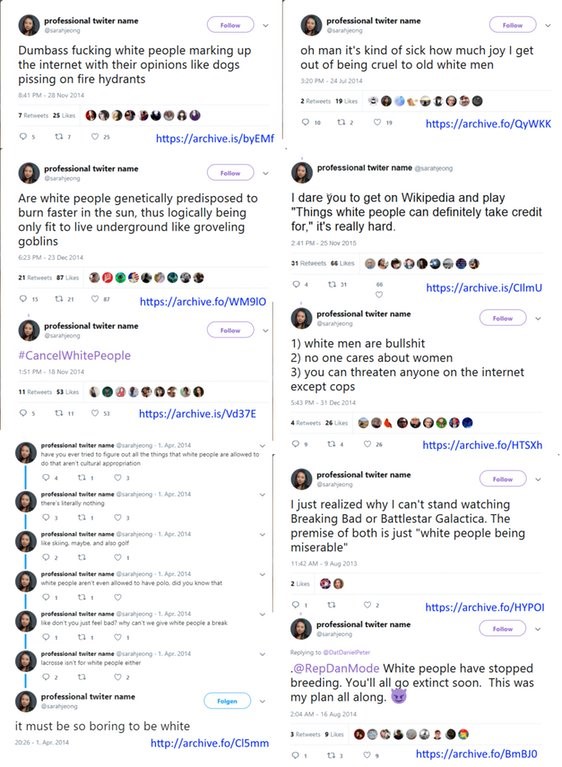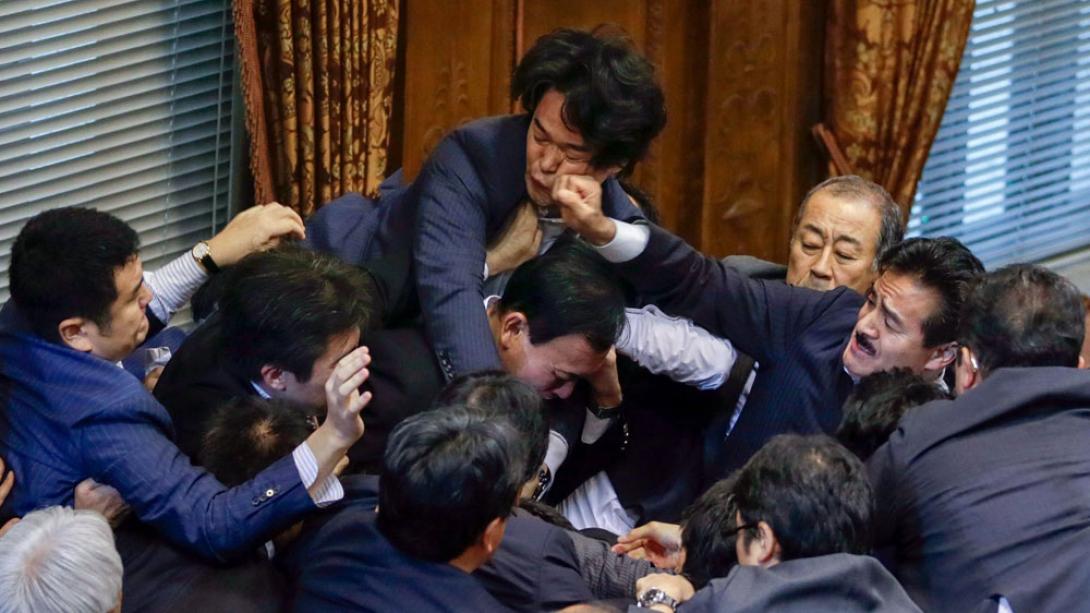These are troubled times indeed. If you’ve been using the Internet for a while, you must have noticed that the general climate has been steadily declining. In fact, it feels like we have grown quite used to our weekly offense-fest. It is speculated that social media platforms are engineered in a way that encourages them: nothing generates more “engagements” than an inflammatory post that the audience will retweet in feverish, self-righteous anger. The mainstream media certainly doesn’t seem to mind, as this provides a constant stream of highly clickable opinion pieces. As for the participants of those heated debates, they get to go to bed feeling vindicated, feeling like they’ve done their part fighting whatever hateful ideology they helped repeal that day. So, what’s the harm?

Source: XKCD
Well, obviously some people’s lives are getting ruined in the process. As a European, there is something I should point out here: our relationship to free speech is quite different from the American one. In the US, the first amendment of the Constitution makes it abundantly clear that people are allowed to say whatever they want. It doesn’t mean that anyone has to listen, but you can’t get jailed or fined for your opinion, no matter how stupid it is. On the other hand, Europe does set some boundaries to can or cannot say. In France for instance, inciting terrorism is illegal. So is Holocaust denial (which is awfully specific if you ask me, but tightly linked to our continent's history).
While this seems like a slight difference between otherwise similar western cultures, I believe this has deep ramifications, which I’ll address in a minute. Personally, I would lean toward the US’ stance on this matter. I like freedom (who doesn’t?) and the idea that there are things I’m not allowed to say is quite unnerving to me. However, one thing I’ve come to understand over the years is that even the US public – or at least, a significant part of it – wants public speech regulated; and since the government opted out of this entirely, the ball has fallen into the lap of the private sector. Facebook says most content is okay (save for nudity and a few other things). CloudFlare will protect any website and only terminated its business relationship with The Daily Stormer due to intense public outcry. I remember being quite shocked, four years ago, when Mozilla’s new CEO had to resign because he had donated to oppose same-sex marriage in the past. People being sacked for their political beliefs? That seemed absolutely crazy to me. It still does. But I must recognize that this is a luxury I “pay for” every day. As the state handles all free speech matters, the public doesn’t have to.
To this day, I have seen a lot of people get canned from US companies for the stupid stuff they post on social media, and even for the things they sincerely believe in. The bottom line is, whether you share my personal opinion that speech should not be regulated at all or not is irrelevant, because as it stands speech *is* restricted in both American and European cultures, either via the legal system or through social pressure.
This brings us to this week’s controversy. Sarah Jeong, a well-known progressive journalist is joining the New York Times’ board. She’s been doing a lot of things conservatives don’t like, such as being an Asian woman, speaking out against surveillance or writing passionately about gender equality. For instance, here’s an article in which she slams Elon Musk for not following any women on Twitter – whether or not that last one counts as fighting the good fight is not something I wish to comment on. In any case, the alt-right must have felt quite vindicated when someone found some of her old tweets:

In a vacuum, these messages certainly look bad. What’s going on? In her response, Ms. Jeong says she was being harassed and responding to violent tweets directed at her, and that she “would not do it again”. I could spend the rest of this blog post writing about the irony of seeing white supremacists lose their collective minds over someone being racist. But I assume that’s been done already; frankly everyone saw that coming. The reason why, after much deliberation, I decided to write about this (non-)story is because I find the liberal’s reaction to be much more interesting. Let’s take a look at what the people who came to her defense had to say (followed by my own comments):
- Sarah Jeong is being targeted by the alt-right. That’s obvious. But you can’t dismiss the alt-right’s claims just based on who they originate from. They’re bound to get some things right from time to time.
- This is an attempt to disrupt and intimidate journalists everywhere. Amidst accusations of sexual harassment from CBS’ president, Stephen Colbert had this awesome segment recently, which showed commendable integrity. I particularly like these quotes: “everybody believes in accountability until it’s their guy”, followed by “accountability is meaningless unless it’s for everybody”. At the other end of the accountability spectrum, The Verge (Ms. Jeong’s previous employer) argued in a blog post that newsrooms should stick together in the face of coordinated attacks against the press. But journalists mess up from time to time, too. Should they be protected just because their demise furthers the alt-right’s agenda? I believe The Verge’s position to be morally bankrupt.
- White racism doesn’t exist. Well, that’s simply not true. There’s no point in denying that there are some who are prejudiced against white people. Just as it’s foolish to imply that they cause actual harm, that it is systemic, or that this is a problem that needs to be addressed at all. Let’s just say that racism against all the other groups is a million times worse and leave it at that.
- The tweets are jokes about white people, which is not racism. Or, as people sometimes put it, it’s not the same to joke about white people as they are the dominant, oppressing group – but joking about a minority would not be okay. Some people feel like this is a legitimate double-standard. I don’t. But what do I know? I’m a white male. I’m not fooling myself into thinking that we’re ready to have a rational debate on that particular subject. All I’ll say for now is that it’s quite difficult to claim the moral high ground when you’re doing the exact thing you’re vocally fighting against. It should be noted that the “jokes” appear to be periodic, a bit gratuitous, and worst of all not particularly funny or witty.
- The New York Times shouldn’t have legitimized the complaints by replying to them. Some people certainly like writing lengthy pieces to explain why we shouldn’t talk so much about the subject of their article.
In the end, Sarah Jeong is not going to lose that job – which is good. I still believe people shouldn’t be fired for whomever they were years ago. The NYT published a statement where they distance themselves from those declarations while supporting their new employee and Sarah Jeong ate the tiniest slice of humble pie she could get away with. As far as I’m concerned, this is a satisfactory conclusion.
If you’ve made it this far, you’re probably expecting some kind of closing statement. For instance, you might wonder whether Sarah Jeong truly is racist. But how would I know that? I’ve never met her in my life or even talked to her. The truth is, it’s beside the point. The controversy isn’t about Sarah Jeong. In a way, it frightens me how few people seem to realize that. When trolls send her death threats (which, by the way, is never ever okay), they’re not expressing hatred towards her as a person – virtually nobody knows who that person is, save her friends and family. They’re protesting what she has become to represent. “Sarah, the concept” is a woman who made a name by calling out others for whatever they did wrong. She is part of a political and mediatic establishment that has claimed the moral high ground and will unleash hell on whomever isn’t aligned with them. A portion of the US population (a little less than 50% according to a recent popular vote) hates being given lessons by the other half. When the story broke, Sarah Jeong also became the embodiment of the liberal’s hypocrisy; the “do as I say, not as I do”-crowd.
Provided with similar opportunities (how about Christian conservatives having affairs?), I strongly believe that the left lashes out just as violently… thus perpetuating this “tu quoque” race to the bottom.
What I hate about the way social media causes us to behave is that it leaves no room for cool heads to prevail. I opened this post with the following observation: people online are edgy like they’ve never been. If you’ve tried discussing anything related to social justice recently, I’m sure you know how emotional debates get. This was my humble attempt at pushing things back in the right direction. If you feel like you haven’t read anything balanced in a while, I hope this helped. I hope you feel less alone.
On a more personal note, I can’t deny that I usually enjoy being an ass to people who deserve it (according to my own judgement, obviously). Which makes me a prime target for retribution. It is also a fact that I’m human and have made, will make mistakes. There is little doubt in my mind that I’ll get my Sarah Jeong moment one day. I hope by then I’ll have finally taken the time to clean up my Twitter timeline.

